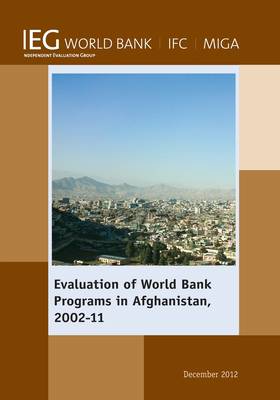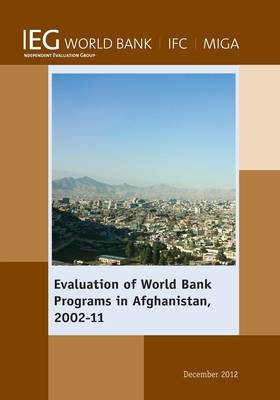
- Retrait gratuit dans votre magasin Club
- 7.000.000 titres dans notre catalogue
- Payer en toute sécurité
- Toujours un magasin près de chez vous
- Retrait gratuit dans votre magasin Club
- 7.000.0000 titres dans notre catalogue
- Payer en toute sécurité
- Toujours un magasin près de chez vous
Description
"This report evaluates the outcomes of World Bank Group support to Afghanistan from 2002-11. Despite extremely difficult security conditions, which deteriorated markedly after 2006, the World Bank Group has commendably established and sustained a large program of support to the country. The key messages of the evaluation are: - While World Bank Group strategy has been highly relevant to Afghanistan's situation, beginning in 2006 the strategies could have gone further in adapting ongoing programs to evolving opportunities and needs, and in programming activities sufficient to achieve the objectives of the pillars in those strategies. - Overall, Bank Group assistance has achieved substantial progress toward most of its major objectives, although risks to development outcomes remain high. Impressive results have been achieved in public financial management, public health, telecommunications, and community development; substantial outputs have also been achieved in primary education, rural roads, irrigation, and microfinance-all started during the initial phase. Bank assistance has been critical in developing the mining sector as a potential engine of growth. However, progress has been limited in civil service reform, agriculture, urban development, and private sector development. - The Bank Group's direct financial assistance has been augmented effectively by analytic and advisory activities and donor coordination through the Afghanistan Reconstruction Trust Fund. Knowledge services have been an important part of Bank Group support and have demonstrated the value of strategic analytical work, even in areas where the Bank Group may opt out of direct project financing. - With the expected reduction of the international presence in 2014, sustainability of development gains remains a major risk because of capacity constraints and inadequate human resources planning on the civilian side. To enhance program effectiveness, the evaluation recommends that the Bank Group help the government develop a comprehensive, long-term human resources strategy for the civilian sectors; focus on strategic analytical work in sectors that are high priorities for the government; assist in the development of local government institutions and, in the interim, support the development of a viable system for service delivery at subnational levels; assist in transforming the National Solidarity Program into a more sustainable financial and institutional model to consolidate its gains; help strengthen the regulatory environment for private sector investment; and scale up IFC and MIGA support to the private sector.
Spécifications
Parties prenantes
- Auteur(s) :
- Editeur:
Contenu
- Nombre de pages :
- 280
- Langue:
- Anglais
- Collection :
Caractéristiques
- EAN:
- 9780821398722
- Date de parution :
- 09-08-13
- Format:
- Livre broché
- Format numérique:
- Trade paperback (VS)
- Dimensions :
- 178 mm x 254 mm
- Poids :
- 494 g

Les avis
Nous publions uniquement les avis qui respectent les conditions requises. Consultez nos conditions pour les avis.






